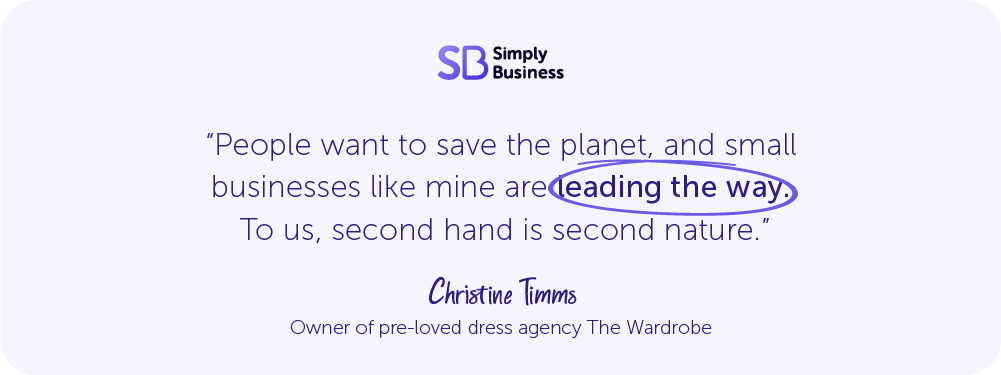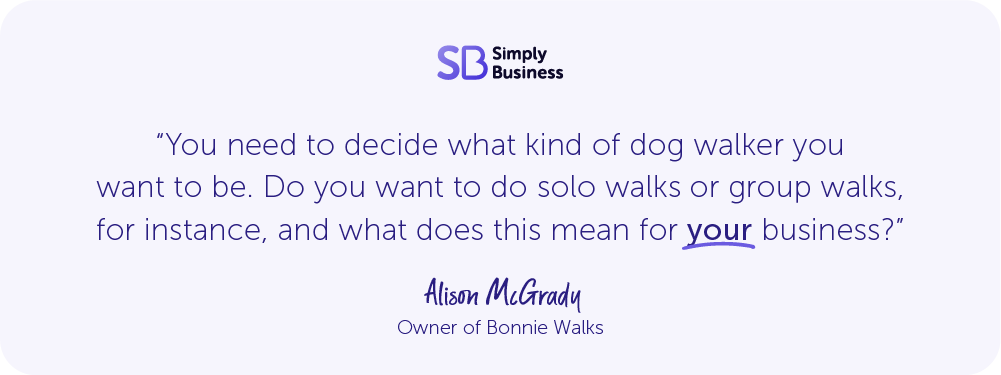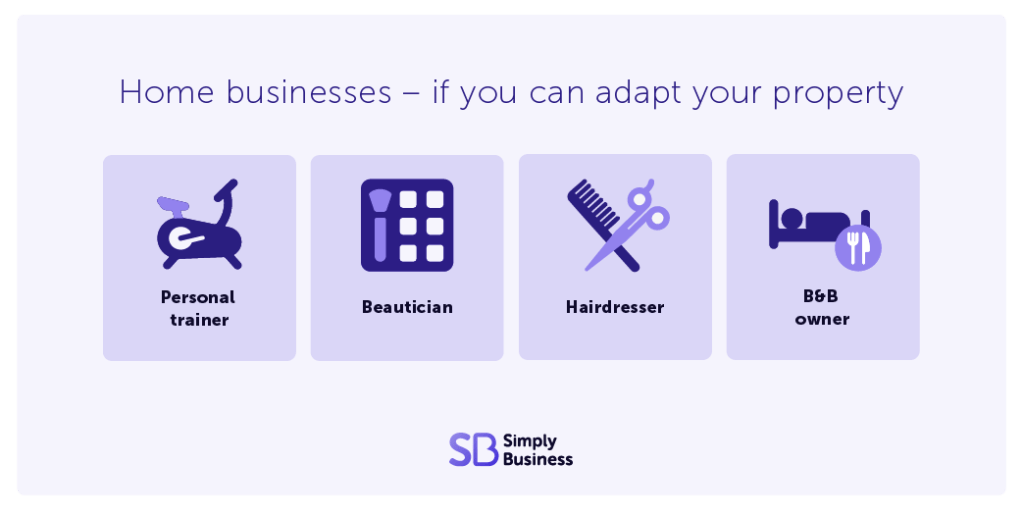Running a business from home can offer a good work-life balance as you set your own hours and don’t have to spend time commuting. Whether you want to start a side hustle or launch into self-employment, we’ve put together a selection of business ideas from home that are relatively simple to set up.
From homemade crafts to looking after children or pets, there’s a range of home-based businesses you could try. Just make sure you know when to ask permission so you don’t get your neighbours complaining to the council.
For inspiration, we’ll cover some ideas you can start right away and others that may require some changes to your property. We’ll also outline the main legal requirements and tips for getting started.
This guide will cover:
11 work from home jobs you could turn into a business
Working from home has become the norm for many people. These ideas would be fairly simple to set up from home and can give you the flexibility of working from home and being your own boss:
Read more: Small business ideas – best businesses to start yourself

1. Sell homemade products
Homemade products are always a popular business idea. Whether you create candles, skincare products, stationary, or art, people like to buy unique products that have been lovingly handmade.
Of course, you can sell your products online using platforms like Etsy. But there are also plenty of craft and makers’ markets to consider, as well as pop-up shop opportunities.
2. Open a dropshipping store
If you don’t have space at home to keep a lot of stock, you could start a dropshipping business.
Dropshipping is when you sell products online through your own shop front and brand, but the orders are fulfilled by a third party.
This kind of business is popular with side hustlers and has unlimited income potential. That being said, it’s a competitive market and there are often logistical or supply chain issues to contend with.
3. Become a freelancer
Whether you’re a copywriter, graphic designer, business consultant, or accountant, there’s plenty of benefits to going self-employed and becoming a freelancer.
Being your own boss means you can choose who you work with and what projects you accept. There’s also likely to be more flexibility and potentially higher long-term earning potential than being employed.
Promoting yourself on LinkedIn is a good way to find new business, while there are plenty of freelance websites you can use to find work.
4. Start a teaching or tutoring business
Demand for tutors and teachers is always high. And if you’re already in the industry, setting up your own business shouldn’t take too long.
It’s important to think about your niche – do you want to focus on a specific subject like music and are there age groups you want to specialise in?
One of the benefits of running your own teaching or tutoring business is that initially, at least, you can fit it around an existing teaching job without too many issues.
Read more: UK business ideas for 2024 – top 10 trends to watch
5. Become an influencer
These days, there’s big money to be made in the influencing world. While you’re unlikely to make millions overnight, if you find your niche and create engaging content, you can start to build your following.
Influencers make money from affiliate marketing, brand deals, and advertising through platforms such as TikTok, YouTube, and Instagram.
If you’re promoting products and services on social media, it’s crucial to follow the rules set out by the Advertising Standards Authority.
6. Resell second-hand items
Due to increased demand for sustainable items, selling second-hand products is a viable full-time job for many. The ease and popularity of platforms like Vinted, Depop, Facebook Marketplace, and eBay means you can get up and running in no time.
You’ll need to think about how to make your shop stand out, plus how to create listings that convert into orders.
Having an effective packaging and shipping process is also key if you want to get good reviews and encourage repeat customers.

7. Start a childminding business
Do you enjoy working with children? Becoming a childminder could be the home business idea for you.
Before you get started, there are childminding courses you can take, and it’s highly recommended that you register with Ofsted.
With working parents being able to claim up to 30 free childcare hours from September 2025, now could be the perfect time to become a childminder.
8. Become a dog groomer or dog walker
The number of dogs has been steadily rising in recent years – there’s an estimated 13.5 million dogs in the UK in 2024, up 1.5 million since 2023, according to UK Pet Food.
This means there’s increased demand for dog grooming and dog walking businesses.
Branching out into this industry is the perfect way to combine your passion for pets with your desire to start a home business. Make sure you come up with a solid business name and protect yourself with the right insurance.

9. Become a life coach or therapist
If you’re a good listener and want to help others, then you might want to consider starting a life coaching or therapy business.
You can run this type of business easily from home, with flexibility one of the key benefits.
If you choose to become a life coach or therapist, you may want to choose a niche such as addiction, relationships, or careers. It’s also important to identify what sort of qualifications you might need to get started.
10. Start a clothes alterations or ironing business
The rising cost of living and increased awareness of sustainability means that people are holding on to their clothes longer. As a result, there’s likely to be plenty of demand for clothes alterations.
And as more businesses require employees back in the office five days a week, the need for ironing services may soon return to pre-pandemic levels.
When starting this kind of business, promoting your services in the local area will be absolutely crucial. Think about the online directories you could sign up for, as well as leafleting all your nearby streets. Once your business is established, word of mouth recommendations are likely to be a significant source of new business.
11. Start a home baking or cookery business
Another business niche boosted by lockdown, home baking and cookery can allow you to work with your passion for food everyday.
As well as marketing your services, you’ll need to think carefully about food preparation areas in your home and food labelling for allergens. The Food Standards Agency provides all the information you need and steps you need to follow.
4 more at home business ideas to consider
Unlike the home-based business ideas listed above, others may require some work to your property, such as converting a garage or decorating a spare room.
Here are some more brilliant home business ideas that may need a bit more time, thought, and capital to get started:

1. Become a personal trainer
If you’ve got a passion for fitness and helping others to achieve their goals, then becoming a personal trainer could be the path for you.
As well as getting the right qualifications, you’ll need to buy equipment such as weights, mats, medicine balls, and ropes. If you want to create a home gym in a converted garage, for example, you may want to look at larger equipment such as a bench press or exercise bike.
Advertising your services online is a good place to start, while these days most personal trainers have a strong social media presence.

2. Become a beautician
Whether you want to be a mobile beauty therapist or create a salon in your own home, demand for beauty treatment is always steady.
Before you get started, you’ll need to think about what treatments you want to specialise in and take the relevant qualifications.
And if you decide to create a salon in your home, making sure the space is bright, calm, and relaxing will be a key consideration.
3. Start a home hairdressing business
Whether you’re an established hairdresser or just starting out, running your business from home could be a good decision.
Some people prefer to have their hair cut in the comfort of the home, whether it be their own or their hairdresser’s. As well as visiting clients, you may be able to convert a spare room or garage into a home salon.
Running your hairdressing business from home means you can be your own boss and won’t have to pay a salon owner a percentage of your takings. You’ll also be able to put your own stamp on your brand and could benefit from a better work-life balance.
4. Become a B&B owner
Have you been inspired by staying in an AirBnb or watching Channel 4’s Four in a bed? If you live in an area popular with tourists, you may want to convert your property into a bed and breakfast.
While this will likely require big changes to your property and way of life, it could be a rewarding business to start if you enjoy hospitality.
Not only will you need to think about things like holiday letting agents, but you’ll also need to focus on the presentation of your property and important smaller details such as a welcome pack.
Why start a business from home?
Starting a small business from home can be rewarding, reduce commuting costs, and offer flexibility. Many businesses start out this way as a way to reduce overhead costs before your venture becomes profitable.
It’s also possible to claim back certain home expenses on your tax return, for example a proportion of your council tax and utility bills.
The time you save by operating from your home can free you up for other tasks like marketing, as well as helping you juggle home and family life.
How to get started with your home business idea
If you’re feeling inspired by our list of business ideas from home, it’s time to think about the practicalities of getting started, from business plans and balance sheets, to creating a website, and marketing.
Read our ultimate guide on how to start a business for all the information you need.
Practical considerations – and what to do about your neighbours
Running a business from home can create various challenges. It’s important to design a functional workspace and make sure you have enough room to store stock (don’t forget stock insurance to help cover you if anything gets destroyed or damaged).
Check your IT equipment is up to date and be aware of any cyber security issues – looking after customer data should be a priority for businesses of any size and it’s important to understand the risks.
Make sure you consider your neighbours when setting up your home business. Some business activities can disturb the local area with noise, regular deliveries, and people coming and going. As long as you’re following noise regulations, doing your best to reduce the impact, and keeping open communication with your neighbours then there shouldn’t be an issue.
Is it legal to run a business from home?
It’s legal to run a business from home, but there are different rules depending on the type of property – such as council houses, rented houses, property you own, garages, and even sheds.
Do you need to ask permission?
The permission you need to ask for before you can run a business from home depends on the type of property you live in. It also depends on whether you own or rent it, as well as the kind of small business you’re setting up.
It’s important to know what’s legal and when your neighbour could complain to the council.
Can you run a business from a council house?
Yes – but you’ll need to get written permission from your local council or housing association, so check with them first. You might need to fill out a form to apply.
Check your tenancy agreement for specific wording that might prevent you from running a business from your council house. If you ask your council and they do give you permission, you might need to sign another agreement.
If you do meet the running a business from home council rules and they give you permission, you might need to sign another agreement.
Can a council refuse you permission to run a business from home?
Your council may refuse permission if they have reason to believe that your business will disturb your neighbours or damage your home. They may also refuse if they think that running a business from home will cause a material change in usage of the property.
For example, if you’ll have delivery vans coming to and from your property, or you’ll be running noisy machinery, you’re probably going to disturb your neighbours.
Running a business from a council property may also have implications for the council tax you pay and the benefits you receive.
Can I run a business from a rented property?
It’s generally legal to run a business from a rented property. You’ll need your landlord’s written permission to run a business from a rented house. You should also check your tenancy agreement to see what it says. If you do get permission, you should get your tenancy agreement changed to reflect your landlord’s decision.
Your landlord can’t ‘unreasonably’ withhold or delay giving permission for you to run a business in the property.
Why would a landlord refuse you permission to run a business from home?
A landlord might refuse permission if they think the rental agreement for your proposed business should be commercial instead of residential. They may also refuse permission if they believe your business will cause the property excessive wear and tear, or your business will cause a nuisance to neighbours.
If you run an internet business, you might not want to register or market your business with your rented property’s address.
As an alternative, you could sign up for a parcel forwarding service if you don’t want to give your residential address for return requests.
This also helps you protect your physical location from disgruntled customers and cyber criminals.
Can you run a business from a property you own?
It’s important to find out if there are any legal restrictions or ‘restrictive covenants’ on running a business from your home. These covenants may prohibit certain uses of your home.
The property title (held by the Land Registry) will include details of any restrictions. You can also check the documents you were given by your solicitor when you bought the property.
Even without these restrictions, you might cause a nuisance to your neighbours, so have a think about whether your business will disturb homes around you.
According to the law, your business will need to be more than just annoying to be a nuisance. It will need to cause damage to your neighbour’s property or hinder their enjoyment of it – but if the nuisance is severe enough, it could mean a trip to court.
Will running a business from your property affect your mortgage?
Residential mortgages often stop you from using your home to run a business, so if you have a mortgage, you should check your terms.
You may need to get permission from your mortgage lender, as breaching the terms of your loan could result in dire consequences (like making it repayable immediately).
Do you need planning permission to run a business from home?
You may also need planning permission if you’re making changes to your home, or if running your business will cause a ‘material change’ in how your property is used.
Checking with your local authority is likely to prevent any problems for you further down the line (getting a Certificate of Proposed Lawful Use or Development will confirm you can go ahead).
Depending on the type of business you’re running, you may need a licence from your local authority. And remember that running a business from home may affect your council tax, because the part of your home that you’re running a business from may be liable for business rates. You can find out more at the Valuation Office Agency.
Can I run a business from my garage?
There isn’t necessarily anything stopping you from running a business from your garage, but you’ll need to ask permission depending on your type of property, as we’ve outlined above.
Whether you can run a business from your garage will come down to the type of business you’re looking to set up and whether it’ll cause a material change in usage of the property.
If your business is likely to cause a disturbance to your neighbours, for example, permission (whether it’s from the council or your landlord) may be refused.
If you own your home, and you’re not sure whether the material use is changing, it may be best to seek planning permission, as we’ve outlined above.
Can I run a business from my shed?
Working from a garden office is a great way to separate your work life from your personal life when you run your business from home. It’s fine to run a business from an office shed, but you should get permission depending on the type of property you live in.
Once again, be sure to think about whether your business will cause a nuisance to your neighbours, or cause a material change in the usage of your property. If you’re running a business from home, planning permission or a licence may be needed if it expands.
Do I have to pay business rates if I run my business from home?
Most home businesses won’t be required to pay business rates. However, you may need to if you’ve made changes to your property to run a business. At the same time, you could be liable for business rates if you employ people at your home.
Read our detailed guide to business rates for more information.
Do I need a licence for my home business?
You won’t need a specific licence for running your business from home.
There are certain trades that require you to have a licence whether or not you work from home.
These include:
- importing and exporting goods
- dog breeding
- childcare
- ear piercing
Do you need insurance for running a business from home?
Having home business insurance can give you the protection and peace of mind you need when running a business.
- professional indemnity insurance – helps protect you if you offer advice to clients (for example, you run a PR business from home)
- public liability insurance – helps protect you if there’s a claim against your business because of accident, illness, or injury (for example, if a customer gets food poisoning because of your food business)
- employer’s liability insurance – is a legal requirement if you have people working for you
Read our guide to the type of business insurance you’ll need to make sure you’re covered.
Useful guides for the self-employed
- What is a freelancer and how can you become one?
- A guide to working out your employment status
- How to get clients as a freelancer or contractor
- How to register as self-employed
Ready to set up your cover?
As one of the UK’s biggest business insurance providers, we specialise in public liability insurance and protect more trades than anybody else. Why not take a look now and build a quick, tailored quote?
